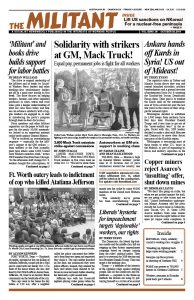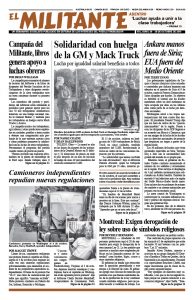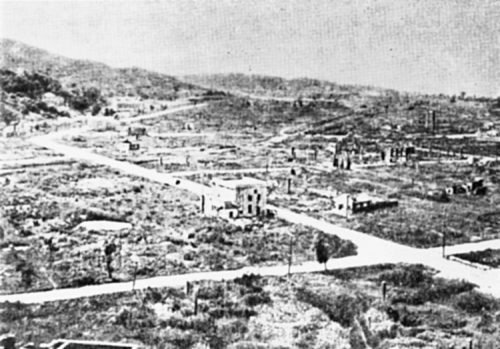Washington should immediately and unconditionally “lift all sanctions against the Democratic Peoples Republic of Korea” and “live up to the White House pledge last year to halt joint war games with Seoul,” wrote Steve Clark, Oct. 10, for the Socialist Workers Party National Committee in a letter to the North Korean government. The letter was sent on the occasion of the 74th anniversary of the founding of the Workers’ Party of Korea.
The letter also demanded an end to “the US government’s ‘nuclear umbrella’ over South Korea and Japan” and that Washington “sign a peace treaty ending the bloody war the US rulers waged against the DPRK from 1950 to 1953.”
The demands are a step “toward halting development and deployment of nuclear weapons on the Korean Peninsula by any government,” Clark explained.
“A world without nuclear arms and other weapons of mass destruction,” he wrote, “is the aspiration of workers and farmers not only across Asia but the world over.”
The first “working level” negotiating session since President Donald Trump met North Korean leader Kim Jong Un in Korea in June took place in Stockholm, Sweden, Oct. 5. The meeting between Stephen Biegun, U.S. special representative on North Korea, and chief North Korean negotiator Kim Myong Gil, ended without agreement. The DPRK’s representative said Washington had come to the talks “empty-handed.”
The U.S. government, backed by the United Nations Security Council, continues to impose harsh sanctions on the DPRK, insisting Pyongyang shut down its nuclear weapons and long-range missile capabilities before steps would be taken to begin to lift Washington’s economic squeeze. The sanctions restrict oil imports as well as metal and agricultural exports. Their impact falls hardest on workers and farmers.
Earlier this year the Trump administration announced it was ending its annual Key Resolve and Foal Eagle “war games.” The deployment of tens of thousands of U.S. and South Korea troops in provocative exercises carried a constant threat of war against North Korea and were a barrier to denuclearization. While an important step forward, these “games” have been replaced with “newly designed Command Post exercises and revised field training programs,” a Pentagon statement said at the time.
“We intend to increase the volume of exercises, including test launches” of Hyunmoo-series missiles, South Korean Joint Chiefs of Staff Gen. Park Han-ki told the Hankyoreh, a South Korean newspaper, Oct. 9. “We also do exercises with joint South Korea-U.S. assets.”
Seoul has also obtained more F-35A fighter jets from the U.S. with plans to have 40 on hand over the next two years. Meanwhile, Washington maintains more than 23,000 troops in South Korea.
The U.N. Security Council condemned an Oct. 2 submarine-launched ballistic missile test by the North Korean government. In response, the DPRK Foreign Ministry pointed out that the Security Council was “mum about the test-fire of Minuteman 3 intercontinental ballistic missile recently conducted by the U.S.”
U.S. rulers divide Korean Peninsula
The root of the conflict goes back to Washington’s division of the Korean Peninsula after World War II, against the will of the Korean people who had been resisting the occupation of their country by Japanese imperialism.
Washington imposed a dictatorial capitalist-landlord regime that crushed popular uprisings in the South. In the North, Korean workers and farmers established their own government, which carried through land reform, and the nationalization of basic industries.
In an attempt to overturn gains made by working people, the U.S. rulers launched the 1950-53 Korean War, using carpet-bombing and napalm to kill more than 4 million people. The war ended in a stalemate, as Korean combatants, with the help of Chinese volunteers, pushed U.S.-led forces back. This was U.S. imperialism’s first military defeat in history.
Members of the Socialist Workers Party are joining other workers to “resist assaults on our rights and on our living and job conditions by the bosses and their capitalist government and political parties,” wrote Clark.
“Toilers engaged in such resistance can and will be won to championing the Korean people’s efforts to reunify their country,” he said. “End all economic sanctions against the Korean people! US military forces out of Korea! For a nuclear-free Korean Peninsula! Korea is one!”


